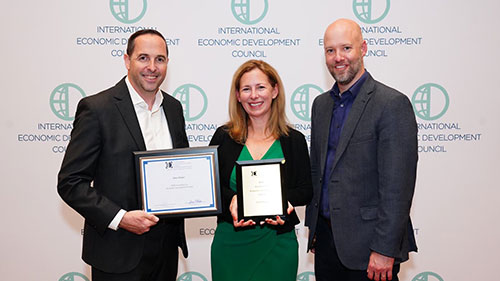
DEI Toolkit
This toolkit was created to help businesses of all sizes take the first steps in implementing a Diversity, Equity & Inclusion (DEI) strategy for their organization or improve upon an existing one. Keep in mind these resources are not comprehensive, but rather a good starting point for you and your business.
The first step in DEI exploration is simply starting. It’s important to recognize your knowledge, baseline, and biases to identify where you are in your DEI journey and continue to develop your skills to be applied independently, organizationally, and communally.
Not all journeys are the same, and they do not always start at the exploration stage. However, the resources outlined in the toolkit are tools, examples, and best practices to support journeys at each stage that apply to every person, organization, and community across Michigan.
Foundations of Exploring DEI
 Exploring DEI independently and organizationally builds a foundation for understanding dimensions of DEI, including personal experiences and backgrounds, biases, inequalities, discrimination, and other considerations of diversity, equity, and inclusion. Understanding where we are individually and organizationally on the DEI journey helps create a vision and focus on meaningful goals to accomplish.
Exploring DEI independently and organizationally builds a foundation for understanding dimensions of DEI, including personal experiences and backgrounds, biases, inequalities, discrimination, and other considerations of diversity, equity, and inclusion. Understanding where we are individually and organizationally on the DEI journey helps create a vision and focus on meaningful goals to accomplish.
Organizational Culture Assessment
The Five Stages of DEI Maturity
Diversity, Equity and Inclusion
DEI Organizational Commitment
A DEI commitment or written statement is the organization’s outward commitment to incorporating DEI internally and externally. It is the beginning stage of inclusivity; it is not meant to be a standalone commitment. A DEI statement and the other outlined strategies should provide MEDC with a pathway to acknowledging DEI internally and externally and aligning DEI goals and strategies.
The second step in the DEI journey is Action and Integration, the opportunity to put meaningful change into practice. This stage is divided into three focus areas: organizations, communities, and Economic Development Organizations. Learn more about the Action and Integration stage through the lens of each of these categories below.

Organizational Action
DEI training at the organizational level creates businesses where leaders, employees, and potential new hires align on the organization's values and commitments.

Community Action
For community action and integration to be effective, it is essential to to include local organizations that impact the holistic development of the community.

EDO Action
A greater awareness of diversity, equity and inclusivity measures can help economic development organizations ensure business owners are are represented and have their voices heard.
The third step in the DEI journey is applying performance metrics to actions taken to identify where actions are being met or need improvement. Because DEI is ever-evolving, it is essential to recognize that tools, resources, and best practices also evolve.
Performance & Evaluation Measures for Michigan Businesses
Businesses and organizations should set and evaluate DEI performance metrics to continue committing to the DEI journey. Setting measures guides how well the organization progresses through the DEI journey and whether adjustments must be made. Committing to performance metrics allows the organization to be transparent to its stakeholders and guides leadership on overarching organizational goals.
The Business Case for Racial Equity
Regularly Monitoring, Using DE&I Data Is Key to Closing Organizational Gaps
Performance & Evaluation Measures for Community and Economic Development Organizations
Although some EDOs aspire to demonstrate DEI principles, many still need to set DEI performance metrics. By establishing a baseline for the organization to build upon, the EDO can measure the impact of DEI internally and externally. The organization must be conscientious about DEI goal accomplishments and setbacks and how those are communicated to its stakeholders. This allows the EDO to be a communal leader in setting DEI standards and advocating for the business community.
The EDO must embed the DEI goals and strategies into offered programs and services to provide for the underserved business community. The EDO must establish an evaluation and monitoring lens for its DEI efforts to evaluate the impact of the DEI goals and strategies. Additionally, it is essential to assess the accessibility of programs and services the EDO offers and where those efforts are lacking for the underserved business community.
Economic Development Performance Measures
Indicators for an Inclusive Regional Economy
Prosper Portland Equity Framework
Additional Resources for Businesses
How People With Disabilities Help The Economy Grow and Thrive
Playbook for the Advancement of Women in the Economy
Additional Resources for Economic Development Organizations
A Playbook for Equitable Economic Development
Diversity, Equity & Inclusion Toolkit
To download, share, and print this toolkit, download the DEI toolkit as a PDF.



